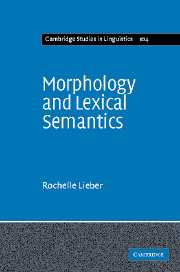2 - Co-indexation
Published online by Cambridge University Press: 22 September 2009
Summary
In the previous chapter we started to sketch a system of lexical semantic representation which is capable of answering some of the fundamental questions raised about the meaning of affixes. I argued that affixes have specific semantic content, and that affixal content can be quite abstract. Having suggested what some of that featural content might be, however, I offered only part of the system we need for exploring the semantics of derivation, compounding, and conversion. In this chapter, I will develop another part of the theoretical apparatus I think we need, namely a theory of co-indexation which allows us to integrate the referential properties of an affix with that of its base.
Why a theory of co-indexation? The creation of a new complex word, whether a derived word or a compound, always involves the integration of multiple parts into a single referential unit. It is this referential unit that determines how many arguments are eventually projected into the syntax. Co-indexation is a device we need in order to tie together the arguments that come with different parts of a complex word to yield only those arguments that are syntactically active. In this chapter I will first look at compounds in English to illustrate the process of co-indexation and its effect on the ultimate interpretation of complex words.
- Type
- Chapter
- Information
- Morphology and Lexical Semantics , pp. 45 - 75Publisher: Cambridge University PressPrint publication year: 2004

